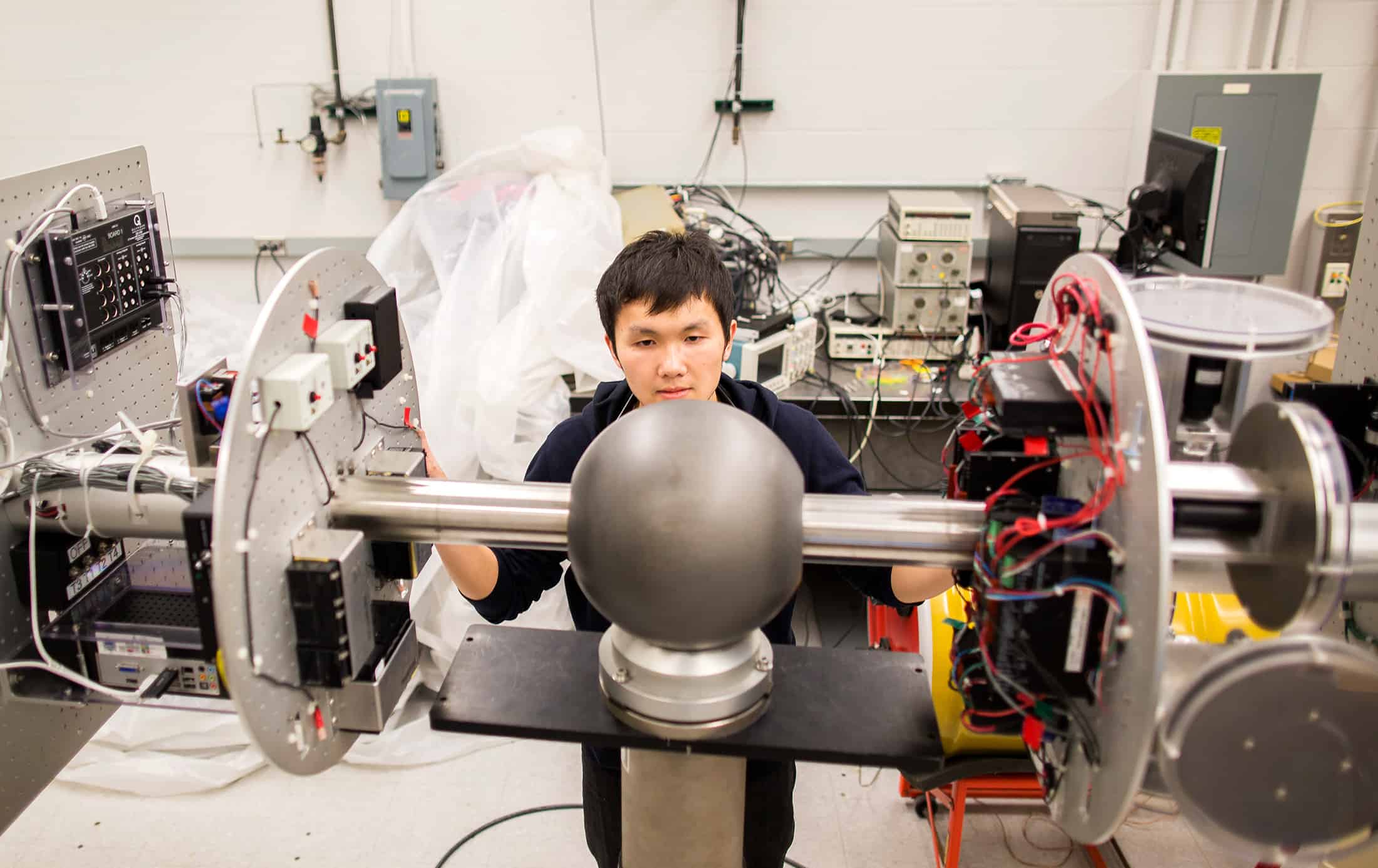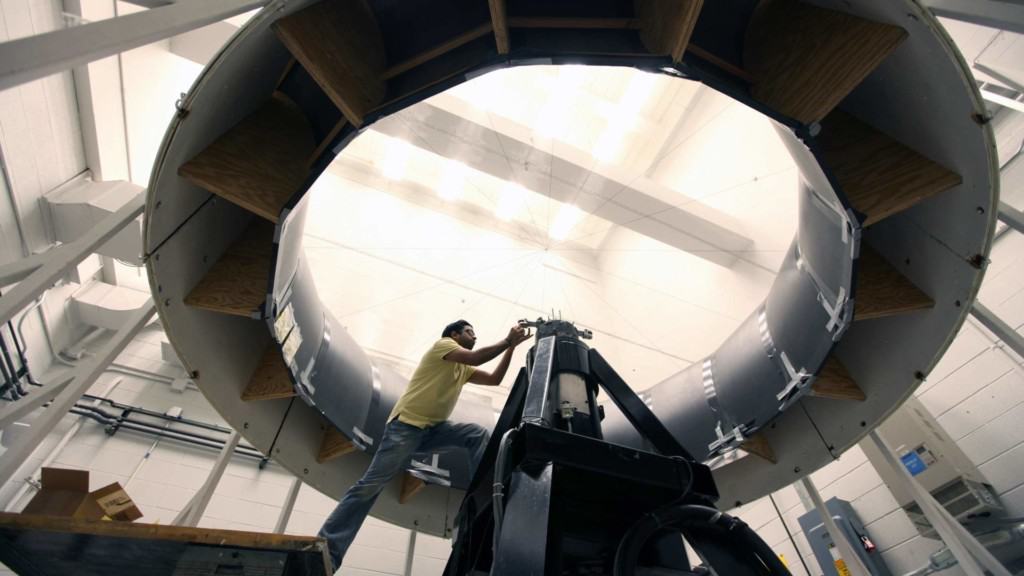
Program Overview
The undergraduate program at the University of Michigan provides a clear understanding of the fields most pertinent to aerospace engineering. By emphasizing real-life issues, the program enables students to learn the most up-to-date applications of classic engineering theories.
At U-M, students in aerospace engineering begin with a set of courses that provide a background in all the fundamental aspects of the field. These span the entire spectrum of aerospace technologies, from aerodynamics and propulsion (collectively referred to as “gas dynamics”), to structural mechanics, flight dynamics and controls.
Courses in gas dynamics look at how fluid and gas flow around bodies and through turbojet engines and rocket nozzles. They also study large- and small-scale air motion in the atmosphere and its relationship to environmental and noise problems.
Structural mechanics courses emphasize lightweight structures and are studied not only from the strength point of view but also in their elastic dynamic behavior.
Flight dynamics and control systems deal with the dynamic behavior of vehicles and systems, their stability and controllability, by pilots and autonomous systems. These courses cover everything from the fundamentals to the design and construction of aircraft, spacecraft and other vehicular systems and subsystems.
In their senior year, students take a design course to learn how all the areas of engineering they have studied work together for the proper function of an overall system. Students can choose between either aircraft or spacecraft systems for their senior design course.

Where can an aerospace engineering career take you?
Undergraduate Program OBJECTIVES
The undergraduate program educational objectives within three to five years after graduation:
- Alumni of the program will use their breadth and depth of knowledge and skills in the fundamental disciplines of aerospace engineering to pursue successful professional careers;
- Alumni will feel that they received outstanding preparation for the next step in their careers, whether it be graduate school or work in industry, government or academia;
- Alumni of the program will be emerging leaders in engineering, science, academia, business and public service; and,
- Alumni of the program will be productive citizens with high professional and ethical standards.
The above program educational objectives are accomplished by a rigorous curriculum that emphasizes fundamentals in basic sciences, mathematics and the humanities, and integrates classroom and laboratory experiences. More specifically, our curricular goals are to:
- Educate students in the fundamental disciplines of aerospace engineering, aerodynamics, materials, structures, propulsion, flight mechanics, orbital mechanics, software, and stability and control;
- Educate students in the methodology and tools of design and the synthesis of fundamental aerospace disciplines necessary to carry out the design of an aerospace vehicle or system;
- Educate students in the basics of instrumentation and measurement, laboratory techniques and how to design and conduct experiments;
- Develop students’ ability to function on multi-disciplinary teams and provide them with teamwork experiences throughout their curriculum;
- Develop students’ ability to communicate effectively;
- Expose students to environmental, ethical and contemporary issues in aerospace engineering; and,
- Expose students to other disciplines of engineering beyond the aerospace field.
Undergraduate Program Outcomes
U-M aerospace engineering graduates demonstrate:
- An ability to identify, formulate, and solve complex engineering problems by applying principles of engineering, science, and mathematics;
- An ability to apply engineering design to produce solutions that meet specified needs with consideration of public health, safety, and welfare, as well as global, cultural, social, environmental, and economic factors;
- An ability to communicate effectively with a range of audiences;
- An ability to recognize ethical and professional responsibilities in engineering situations and make informed judgments, which must consider the impact of engineering solutions in global, economic, environmental, and societal contexts;
- An ability to function effectively on a team whose members together provide leadership, create a collaborative and inclusive environment, establish goals, plan tasks, and meet objectives;
- An ability to develop and conduct appropriate experimentation, analyze and interpret data, and use engineering judgment to draw conclusions;
- An ability to acquire and apply new knowledge as needed, using appropriate learning strategies.
| Aerospace Engineering Program Degrees Awarded | 2017 | 2018 | 2019 | 2020 | 2021 | 2022 |
|---|---|---|---|---|---|---|
| Bachelors Degrees | 94 | 106 | 112 | 132 | 126 | 165 |
| Masters Degrees | 64 | 60 | 77 | 71 | 80 | 77 |
| Doctoral Degrees | 17 | 33 | 16 | 18 | 28 | 16 |
| Total | 125 | 199 | 205 | 221 | 234 | 258 |
Recent Undergraduate Enrollment Data (Sophomores, Juniors, and Seniors)
| 2018-2019 | 352 |
| 2019-2020 | 379 |
| 2020-2021 | 371 |
| 2021-2022 | 371 |
| 2022-2023 | 358 |
The Aerospace Engineering (B.S.E.) program is accredited by the Engineering Accreditation Commission of ABET, https://www.abet.org, under the General Criteria and the Program Criteria for Aerospace and Similarly Named Engineering Programs.
GET YOUR MASTER FASTER
The Rackham Sequential Undergraduate/Graduate Studies (SUGS) program allows current U-M students to complete an undergraduate and Master’s degree in five years.
